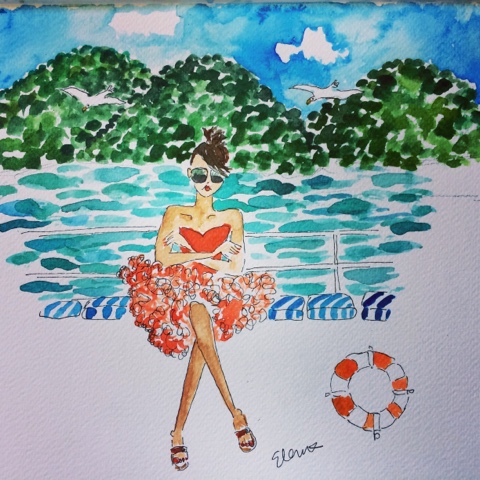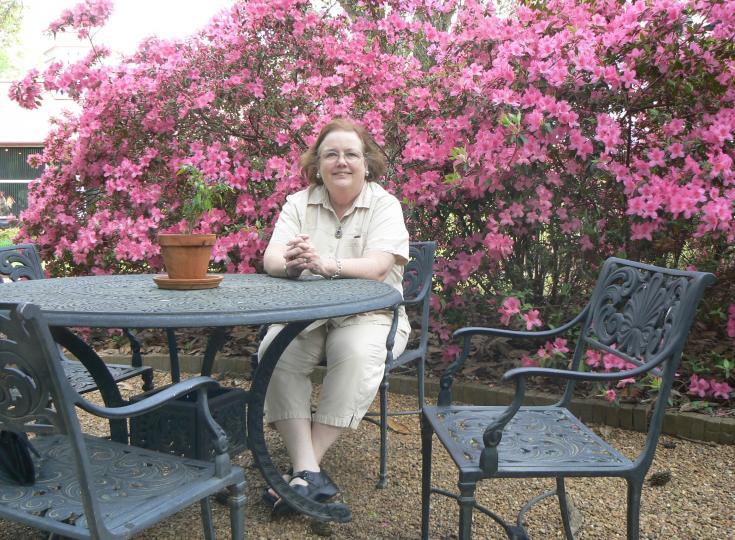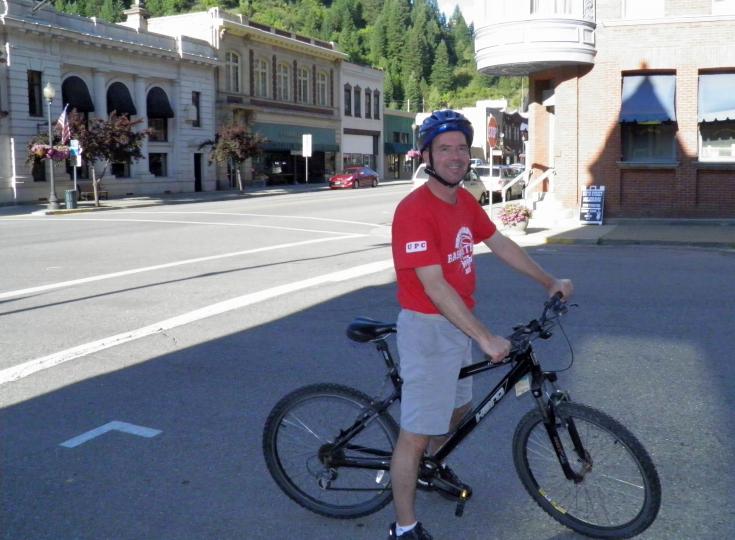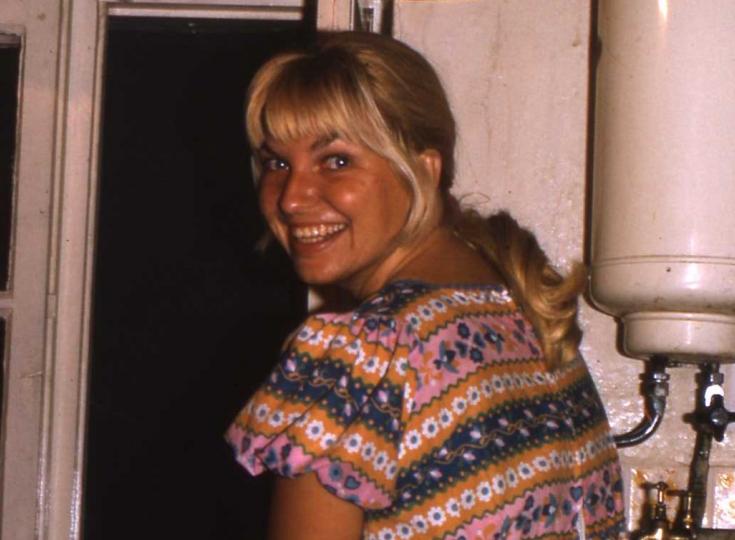Maria Elena Sandovici - The Grass Isn't Always Greener

Having lived in both Romania and the U.S., Maria Elena Sandovici soon discovered that life in a foreign country isn't necessarily easier or better than where you grew up. Her book, Dogs With Bagels revolves a lot around this theme. Today we chat with her about homesickness, using flawed characters and the meaning behind the title of the book.
Please give us a short introduction to Dogs with Bagels
Dogs wth Bagels is the story of a Romanian family that immigrates to New York City in the summer of 1989, ironically just a few short months before the Romanian Revolution which would have allowed them to enjoy political and economic freedom at home. The family is ripped apart by the mother's homesickness and her bitterness towards her husband. While she finds the immigrant experience heartbreaking and alienating, he has an easy time adapting to the challenges of their new life, and ultimately flourishes in his new environment, reinventing himself as a successful business man, finding new friends and a new lover. Their daughter grows up navigating between two households, one in Manhattan, one in Queens, two hostile parents, and two worlds to which she's not entirely sure she belongs. She channels her mother's nostalgia for Europe into learning foreign languages she's too shy to speak, and her father's gusto for New York into craving a life of luxury she can't afford. Surviving on bagels and cheap coffee while swaddled in borrowed designer clothes, she wants to make it on her own, but clings to potential saviors, including a fiance she can't make herself love.
After immigrating to New York Maria Pop gets homesick and has regrets. Is that something you have had to deal with in your own life as well?
Yes, big time! I was never an immigrant, like Maria, but when I came to the U.S. to study, I was very homesick. I mean crying myself to sleep at night, and longing for the days when I could enjoy simple things I'd taken for granted before, like watching silly sit-coms with my mom after school. This was before Skype, so it was tough. I'd write letters and mail them, and by the time they made it home everything in them would be old news. I realized I was too home-sick to leave Romania for good. I still wanted to be able to occasionally enjoy day-to-day life there, which has a different feel and color than day-to-day life elsewhere. Romanian families are close-knit, much like Italian families, and I was lucky enough to grow up being very close to my grandparents, my great-uncle, and a whole bunch of opinionated aunts I happen to adore. I wanted to still be able to enjoy normal day-to-day experiences with my family, to share the kinds of moments you can't over the phone or during a short visit when everybody feels the pressure to be on their best behavior. The only way I could pursue studies abroad was if I got to go back for long winter and summer breaks, whole months when it felt like I still lived there, and we could all be our normal selves. Later, I chose an academic career because it allows me to continue traveling back and forth. Even so, being an expat is hard at times. I love my life in the U.S. and am much less homesick than I used to be. But it's still there, that feeling of being torn between two different worlds, of trying to have a life in two places.
I was still in school when I began imagining Maria's story. I started thinking of how hard it would be if I were an immigrant instead of a student, perhaps an immigrant with a difficult economic situation, and if I were stuck missing home but not being able to go back. Then I thought how horrible it must be if I were married to someone who didn't understand my homesickness. I realized that I would leave them. But what if I had children? That would make it harder for me to leave, but I'd still want to. Would that make me a terrible person? Maybe, but then again... That's how Maria's story was born.
Dogs with Bagels explores the theme of the American Dream gone bad. What made you pick this theme?
I realized at an early age, that people often fall prey to idealizing places they don't necessarily know much about. For many, the U.S., seen through the lens of movies or on vacation, can seem like the land of milk and honey. In truth, life here has its joys and it has its difficulties. Like anywhere else. The title of the book is a metaphor for having unrealistic expectations.
Your characters are flawed but very relatable. Why did you decide to use flawed characters for this story?
I like flawed characters. I find them believable and compelling. We're all flawed. It's interesting to understand flaws and see how people struggle to come to terms with their own shortcomings. In the end, our biggest adventure in life is understanding our own selves, forgiving our own mistakes, and finding ways to become better people, while keeping in mind that none of us will ever be perfect. It's the kind of stuff I like to read.

Dogs with Bagels is told from three different points of view. Why did you take this approach?
I took seven years and about twelve drafts to write this book. I started with an omnipresent narrator, but quickly abandoned that point of view. It struck me as cold. I wanted the characters to tell the story. I wanted to get into their heads, into their hearts. But I also wanted, occasionally, to distance myself from them, to see them from the outside, through somebody else's eyes. I tend to like books written from multiple poits of view. It's very postmodern, also a bit daring. I've had critics say this simply isn't done. Why not? I've read and loved books who do it, and I don't believe in following conventions for conventions' sake.
What do you hope readers take away from this book? Does it contain a hidden message?
Yes. The not-so-hidden message is about happiness. How we're responsible for our own happiness, but also how there is not one prescribed way, or one ideal place to find it. Of course, it's easy to say this kind of stuff, even to understand it, but applying it in real life is much harder. All characters learn something in the story. They all grow. Yet when readers asked me to write a sequel, it was easy to imagine the Pop family struggling with similar issues a decade later. The follow-up book, Lost Path to Solitude, practically wrote itself.
Tell us more about the title. Why "Dogs with Bagels"?
It's a metaphor for holding unrealistic expectations. It comes from something my grandmother tends to say. My grandmother, by the way, is 94 years old, lives with her sister in southern Romania, and when I visit her tells me about ten times a day that I made a mistake leaving the country and that I should come back for good. It's a hard thing for me to hear because she's right in her own way. There's wisdom in not searching for happiness too far away, but then again, there's wisdom in feeling free to explore the world too, isn't there? In any case, my grandmother, who is a queen of irony, says: "Why would you go all the way to America? What did you expect to find there, dogs with bagels on their tails?" By that she means abundance. Money growing on trees, that kind of stuff. Not that money growing on trees would necessarily equal happiness, but grandma's a tad materialistic. We all are, to some extent, but happiness is more complex and more elusive than wealth. Still, there's a simple realism in my grandmother's saying. There are no dogs with bagels on their tails anywhere in this world. No pot of gold at the end of the rainbow. There is no land of plenty, no fairyland where unicorns roam freely, just faraway lands to explore that are different, not necessarily better, because no place is ideal. Wherever you go, there you are. You're still you, and you have to work hard at figuring out who you are and what makes you tick.
Did you design the cover? How did it come about?
Yes, I designed the cover using one of my paintings. I paint watercolors every day, and post them on my blog, Have Watercolors Will Travel. The one for the cover is of one of those paper coffee cups you get on the street or in delis in New York City, the blue cups with the Greek pattern, that say 'We're proud to serve you.' I find them emblematic for New York, but they also play an important part in the story, as Liliana, one of the main characters, ends up living on cheap coffee and bagels when she finds herself in dire straits.
Do you read the reader reviews? Or do you avoid them so they don't interfere with your artistic vision?
I do read them! I love getting reviews, and I wish more people posted them! I'm never afraid of reviews interfering with my artistic vision. There are things I feel strongly about, things about my writing and my characters that I know instinctually. These will not change because of a review. But, for example, when readers asked for a sequel to Dogs with Bagels, I listened, and I'm happy I did. That book (Lost Path to Solitude) was so much fun to write!
Which character did you find the most difficult to create?
I had trouble with Greg. Greg is a perfectly likeable guy, but Liliana can't get herself to truly like him. She feels guilty about that. She tries to change the way she feels. But when there's no chemistry, there's no chemistry, right? He's decent and he falls for her hard, but she doesn't feel that elusive love connection. He's the 'good on paper' guy as described in Sex and the City. He was hard for me to write, because he's full of good qualities, but for some mysterious reason unappealing. He's someone who would do just fine if Liliana wanted to settle, but whom she'd probably end up resenting later. I wanted to make sure I was being fair in describing this character. Greg doesn't deserve to be disliked. In writing him into the story I wasn't criticizing him but rather the idea of settling instead of waiting for true love, and yes, even taking the chance of ending up alone.
What will we see from your pen next? What are you working on right now?
I'm working on two novels as we speak. One is about a woman who runs away from the social constrictions of small-town life and finds herself without a tribe. I'm thinking of calling it Lone Wolf. The other book is about a juvenile delinquent of sorts who embarks on a bunch of international misadventures as she tries to figure out the mystery of her mother's death.
Where can our readers discover more of your work or interact with you?
On my website (www.elenasandovici.com), on the book's website (www.dogswithbagels.com), on my blog, Have Watercolors Will Travel (havewatercolorswilltravel.blogspot.com/), on social media (@SandoviciME on Twitter, @mariasando on Instagram, on my page, Maria Elena Sandovici, on Facebook), or at my art studio at Hard and Nance in Houston. If you enjoy the book, you might find these book club discussion questions fun: http://havewatercolorswilltravel.blogspot.ro/2015/08/dogs-with-bagels-book-club-discussion.html
I love book clubs, so if you're considering having one anywhere within 100 miles of Houston, I'd be glad to attend!





